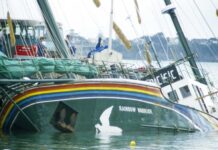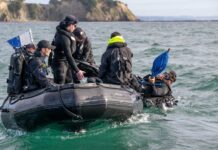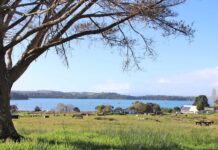
Just before Cyclone Gabrielle arrived, Native Bird Rescue managed to stabilise three fledgling gannets, then transferred them over to Birdcare Aotearoa who have a larger, more suitable habitat. “We have a fantastic relationship with them, they take our gannets and native baby birds to be raised with others of the same species and we rehabilitate their kororā/little blue penguins as we have the species-specific facilities for them, including the seabird pool,” says Native Bird Rescue founder Karen Saunders
“The seabirds especially have been arriving sick, not injured but underweight and with diarrhoea and/or vomiting. It’s just awful; they are critically ill, we are giving them subcutaneous fluids and medications, as they can’t hold anything down, but sadly we are just getting them too late and few have survived. We suspect they are sick from diseases like e-coli, salmonella and all of the other nasties that is in the sewerage and runoff that has turned our Hauraki Gulf into a big toilet bowl. We have admitted tara/white-fronted terns, kāruhiruhi/pied shags, tarāpunga /red-billed gulls and kororā/little blue penguins,” Karen says.
“During and after the heavy rain and cyclone the Auckland Council Safeswim map was covered in red warning flags saying it was not safe for humans to swim. That is where these birds live. They bathe in, eat from and drink this same water we are advised not to even swim in. If you look on the Safeswim map, Little Oneroa and the eastern end of Onetangi Beach have long-term alerts ‘Water quality consistently poor, swimming not advised.’ The Hauraki Gulf was basically one big toilet bowl of contaminated water, a health hazard for humans and deadly for our seabirds.”
She says during those events kororā were also found in various stages of their annual moult, a two-and-a half week process, during which they are not waterproof and can’t go into the water, as they get cold quickly and can’t eat or drink.
“Sadly we have had many in this year with interrupted moults or they have been found out of their burrows. The ones we have admitted have all been severely underweight and too weak to go back out into these conditions to find food. This is the first year we have seen these sorts of cases. Please remember that if you see a kororā/little penguin out in the daytime it is most certainly in need of help, so please pick it up, put it in a shopping bag or box and give us a call on 020 473 9464 immediately.” • Karen Saunders






